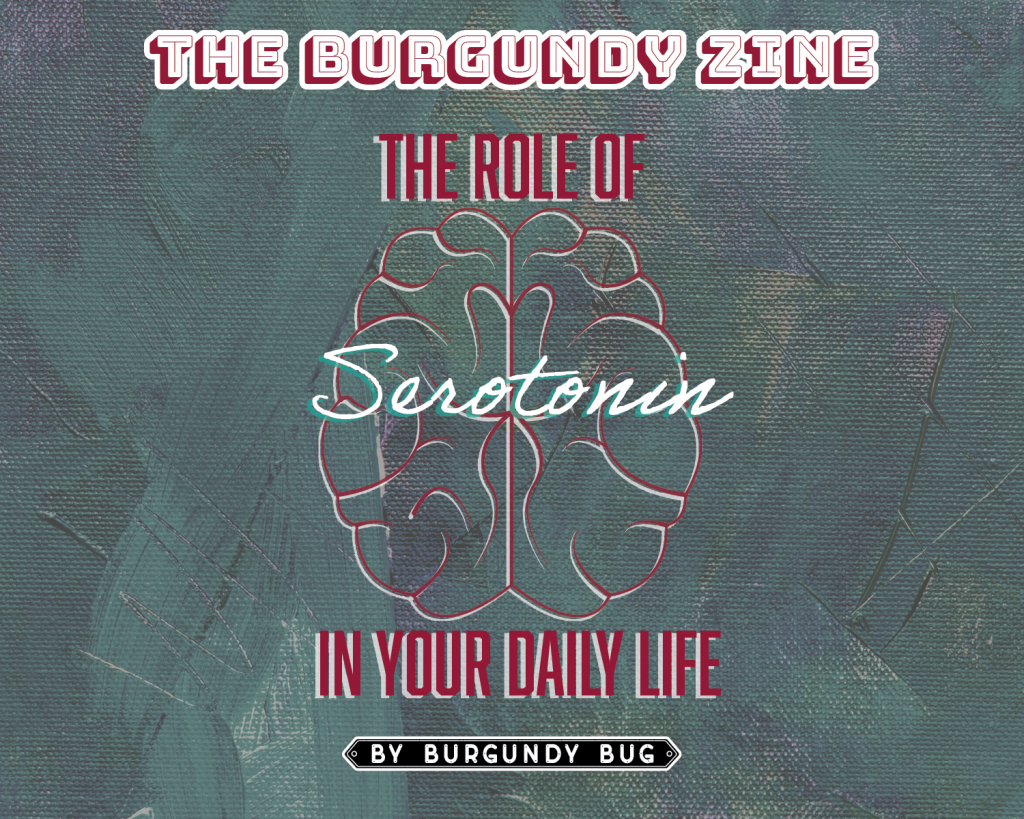October 14, 2019
The Role of Serotonin in Your Daily Life

By: burgundy bug
The Role of Serotonin in Your Daily Life by Burgundy Bug
Source: The Burgundy Zine
Serotonin is a hormone associated with mood regulation and well-being, but its functions go far beyond that.
Countless research over the last few decades has linked serotonin to regulating stress, long-term memory recall, sleep, digestion, blood pressure, and body temperature.
The hormone has also been critical to furthering the understanding of various neurological, behavioral, and emotional conditions, such as depression and migraines.
Serotonin and the Brain
Table of Contents
- Serotonin vs Dopamine
- Serotonin and Stress
- Serotonin and Memory
- Serotonin and Depression
- Serotonin and Migraines
- Serotonin and the Body
On a neurological level, serotonin helps brain cells communicate with one another, according to Hormone Health Network.
Serotonin naturally stabilizes emotions, attention span, and happiness. Low levels of serotonin are often associated with emotional or behavioral disorders, such as anxiety, depression, and obsessive-compulsive disorder.
However, it’s important not to confuse serotonin with the happiness hormone, “dopamine,” a chemical released by neurons that plays a vital role in learning and motivation, states a review published in Nature Neuroscience.
Serotonin vs Dopamine
“Two of the most important neurotransmitters involved in mood are dopamine and serotonin. Positive mood and negative mood mediated by dopamine and serotonin levels.”
Happiness & Health: The Biological Factors- Systematic Review Article | Iranian Journal of Public Health
Both serotonin and dopamine attribute to maintaining happiness, according to a review published in the Iranian Journal of Public Health.
Higher levels of dopamine are associated with an uplifted mood that has an impact on cognition.
Dopamine also signals to the brain how rewarding an activity may be, as seen in Nature Neuroscience’s review. When an activity doesn’t stimulate the release of dopamine, there’s less motivation to devote attention and energy to the task.
On the other hand, serotonin is associated with the stability of happiness, satisfaction, and optimism, states the Iranian Journal of Public Health’s review.
In other words, dopamine motivates and makes you happy, while serotonin maintains happiness and satisfaction. Similar, but not quite the same.
Serotonin and Stress
A review published in the Journal of Psychopharmacology found serotonin enhances response to stress by acting on neural pathways responsible for coping, stress tolerance, and neuroplasticity.
Neuroplasticity refers to the brain’s ability to adapt and change, according to Brainline. Serotonin makes it easier for the brain to physiologically restructure, which would be helpful in prolonged periods of stress.
However, chronic stress can also alter serotonin receptors and lead to a decrease in the hormone, states research published in The Journal of Neuroscience.
Serotonin and Memory
Serotonin plays a selective role in memory recall, particularly in mice, based on evidence published in Neuropsychopharmacology.
After inhibiting the serotonin receptors in mice, researchers observed object recognition impairments.
“No alterations were found in tasks for social recognition, procedural learning, or fear memory,” states the researchers. “…Our data suggest that hyposerotonergia selectively affects declarative hippocampal-dependent memory.”
The hippocampus is responsible for declarative memory and the organization of how the cerebral cortex represents memories, according to research published in the Proceedings of the National Academy of Sciences.
Declarative memories are conscious, long-term recollections of facts and events, as defined by the Encyclopedia of Psychopharmacology.
The findings in Neuropsychopharmacology’s research suggests that serotonin allows the brain to recall the facts and events stored in the hippocampus, but their evidence didn’t show a direct correlation between procedural learning or emotional-based memories.
Serotonin and Depression
“The ‘serotonin hypothesis’ of clinical depression is almost 50 years old. At its simplest, the hypothesis proposes that diminished activity of serotonin pathways plays a causal role in the pathophysiology of depression.”
What has serotonin to do with depression? | World Psychiatry
As stated in a review published in World Psychiatry, researchers have suspected serotonin is at the root of depression for over half a century. More recent research claims that depression is far more complex than a simple serotonin deficiency.
“Indeed, dogged by unreliable clinical biochemical findings and the difficulty of relating changes in serotonin activity to mood state, the serotonin hypothesis eventually achieved ‘conspiracy theory’ status, whose avowed purpose was to enable industry to market selective serotonin reuptake inhibitors (SSRIs) to a gullible public,” states the review.
The review goes on to say that serotonin is related to depression recovery. Their findings suggest that low serotonin can trigger another depressive episode in individuals who have been depressed or ill in the past, but the same can’t always be said for those who have never been depressed or ill before.
This aligns with serotonin’s role in mood regulation and maintaining happiness; if you have suffered a depressive episode before, a decrease in serotonin would inhibit your ability to maintain a positive mood after recovering.
Serotonin deficits are also evident in cases of major depressive disorder, alcohol use disorder, and suicide, found research published in Translational Psychiatry. Recurring depressive episodes would be common among all MDD, AUD, and those who have died by suicide, which supports the evidence in World Psychiatry’s review.
Serotonin and Migraines
Triptans are a class of drugs that mimic serotonin and are commonly used to treat migraines, reports the U.S. National Library of Medicine.
According to a review published in The Journal of Headache and Pain, migraines are caused by ion channel dysfunction, which disrupts electrical activity in the brain. Migraine sufferers also display varying levels of neurotransmitter dysfunctions, which impact the brain’s ability to create, release, and filter out serotonin.
This could explain the cause of multiple symptoms associated with migraines, such as fatigue, nausea, loss of appetite, and mood disruptions.
A study published in Neuroimage Clinical last year disputed evidence in prior studies that suggested migraines were a symptom of overall low serotonin levels. By contrast, their participants, who had chronic migraine attacks, showed higher levels of serotonin than average in between migraine episodes. The migraine group also displayed lower levels of receptors binding to serotonin.
Rather than a serotonin deficit, those who suffer from chronic migraines may have excess serotonin that isn’t binding properly to their neurotransmitter receptors during migraine-free periods.
Additional research published in the Annals of Neuroscience says a drop in serotonin is observed in those who have migraines during an attack. In their study, they observed migraines caused by a drop of serotonin from a decrease in estrogen during menstruation or from taking birth control.
Other factors, such as diet, sleep, and stress, can affect serotonin levels, which explains why some of the most common migraine triggers relate to these three factors.
Excess serotonin, as seen in serotonin syndrome, can have symptoms as mild as agitation, diarrhea, vomiting, and tremors, or as life-threatening as fevers, delirium, seizures, respiratory failure, comas, and death, according to The Ochsner Journal.
While the elevated serotonin levels observed in the participants of Neuroimage Clinical’s study didn’t qualify for a serotonin syndrome diagnosis, their levels were still higher than the control group.
The participants’ elevated levels may explain why a sudden drop in serotonin would cause even more neurological imbalance (resulting in a migraine) than an individual with average levels of serotonin that suddenly fall and don’t trigger a migraine. Additional research needs to be conducted to confirm this hypothesis and give us a better understanding of how migraines relate to serotonin.
Serotonin and the Body
Table of Contents
- Serotonin and Sleep
- Serotonin and Digestion
- Serotonin and Appetite
- Serotonin and Urination
- Serotonin and Blood Pressure
- Serotonin and Body Temperature
- In Conclusion
Serotonin and Sleep
Serotonin is the precursor to melatonin, a hormone that affects reproduction and sleep-wake cycles, reports Colorado State University.
Melatonin is produced by the pineal gland at night, according to the National Sleep Foundation. On its own, research shows that taking melatonin won’t make you fall asleep, but it can help reset the body’s biological clock in cases of jet lag or shift-work.
Together, serotonin and melatonin play a vital role in maintaining circadian rhythm. Serotonin is converted into melatonin, which regulates the body’s sleep-wake cycle.
Serotonin and Digestion
Most serotonin in the body is created, stored, and released by cells within the digestive tract. This contributes to how the gut communicates with the central nervous system.
Serotonin has long since been recognized as an important molecule for signaling movement in the digestive tract, according to research published in Nature Reviews Gastroenterology & Hepatology.
Serotonin also signals to the brain whether we feel full and communicates discomfort related to digestion, such as nausea or abdominal pain.
Serotonin and Appetite
Serotonin plays a role in controlling appetite, as seen in Basic Neurochemistry’s review.
Behavioural Brain Research published a study that found certain serotonin receptors contributed to satiety – “feeling full” – in rodents, but there were other interactions at play that demonstrated the complexity of serotonin’s relationship to appetite regulation.
A more recent study published in the peer-reviewed journal, Diabetes, found the interaction between serotonin and glucagon-like peptide 1 reduced appetite and weight.
Serotonin and Urination
Frontiers in Neuroscience published a study that shows how serotonin affects the bladder’s ability to contract and relax in mice, which could provide insight to understanding urine retention and incontinence in humans.
A deficiency in particular serotonin receptors prevents the central nervous system from being able to fully communicate with the bladder, affecting urine control.
Serotonin and Blood Pressure
The relationship between serotonin and blood pressure is complex, but evidence published in Pharmacological Reviews says serotonin can decrease blood pressure over long-term intervention.
Their research also shows that serotonin’s relationship to blood pressure and body temperature are related since the decrease in blood pressure occurred as body temperature was lowered.
However, a study published in Dovepress saw few differences in blood pressure between their group of participants who took serotonin-reuptake-inhibitors (SSRIs) and a placebo in short-term as well as long-term trials.
Serotonin and Body Temperature
Thermoregulation is another function of serotonin, but the connection remains quite complicated.
So far, it’s known that chronic stress affects serotonin, disrupting body temperature regulation, based on evidence in the peer-reviewed journal, Stress.
As seen above, research in Pharmacological Reviews observed a decrease in body temperature that correlated with lowered blood pressure over a long-term period.
A study published in the Journal of Applied Psychology found rats with a serotonin deficiency were unable to regulate their body temperature or breathing when exposed to cold temperatures externally.
Research in The Journal of Steroid Biochemistry and Molecular Biology says serotonin can be effective in treating hot-flashes during menopause, which are caused by a slight elevation in core body temperature.
However, excess serotonin – like in serotonin syndrome – can result in fever.
Methylenedioxymethamphetamine is an illicit drug commonly associated with fever and dehydration, according to the National Institute on Drug Abuse.
One of the hormones released during MDMA use is serotonin, potentially inducing serotonin syndrome in high dosages, which explains why fever is a concern among users.
In Conclusion
Serotonin regulates a wide range of systems throughout the body. Neurologically, serotonin is associated with mood stability, stress coping mechanisms, and long-term memory recall.
Physiologically, serotonin regulates circadian rhythm, digestion, appetite, urination, blood pressure, and body temperature. The hormone allows our central nervous system to communicate with various systems throughout the body.
However, too much of a good thing can be a bad thing. While serotonin deficits can cause a wide range of bodily dysfunction, excess serotonin can be deadly.
Interested in having content featured in an upcoming blog post or issue of The Burgundy Zine? Head on over to the submissions page!
For all other inquiries, please fulfill a contact form.


